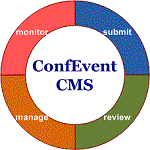A self-adaptive system changes its behavior in response to stimuli from its execution and operational environment.
As software is used for more pervasive and critical applications, support for self-adaptation is increasingly seen
as vital in avoiding costly disruptions for repair, maintenance and evolution of systems. Self-adaptation may result
in changes to some functionality, algorithms, or system parameters, as well as to the system’s structure or any other
system aspect. Moreover, an autonomic self-adaptive system may have intrinsic intelligence that may help it reason
about situations where autonomous decision making is required. The major challenges to overcome in order to achieve
adequate self-adaptive behavior are related to monitoring, quality and quantity of knowledge and awareness. A
successful self-adaptive system meets those challenges to emphasize features like adaptability, autonomy, mobility,
robustness, and dynamicity.
Developing self-adaptive systems requires new approaches that can efficiently tackle the problems of expressing autonomy
requirements, designing and implementing self-adaptive features, and efficiently testing self-adaptive behavior. This
satellite event to the ICTCC 2014 is a good opportunity to bring
together researchers in formal methods and related fields interested in the opportunities and the challenges of developing
self-adaptive systems. We welcome both theoretical and applied contributions related to the relevance and potential of formal
methods in engineering self-adaptive systems.
|
TOPICS
- formalism for expressing autonomy requirements and modeling self-adaptation;
- tools and approaches for implementing self-adaptive systems;
- tools and approaches for verification and testing self-adaptation;
- run-time verification;
- verification of non-deterministic systems;
- algorithms for self-adaptation and self-management;
- knowledge representation for cognitive systems;
- approaches to autonomous decision-making;
- modeling awareness and self-awareness;
- robustness and fault tolerance;
- mobility;
- monitoring;
- software architectures;
- code generation;
- bio-inspired algorithms;
- simulation;
- machine learning.
|


Submit your paper here
|
Other topics related to self-adaptive systems and of particular interest are: autonomic computing, mobile computing, multi-agent
systems, resilient systems, unmanned exploration systems, service-oriented systems, robotics, sensor networks, adaptable user
interfaces and pervasive systems.
FMSAS 2014 will be held in conjunction with the The 1st International
Conference on Nature of Computation and Communication (ICTCC 2014) hosted by EAI, the European Alliance for Innovation.
All accepted papers will be included in the ICTCC 2014 Conference Proceedings, scheduled to appear in the Lecture Notes of ICST (LNICST)
series jointly published by ICST and Springer and indexed in DBLP, Google Scholar, ISI Proceedings, EI, CrossRef and Zentralblatt Math.
Best papers might be considered for publication in an expanded form in the special issues of ELSEVIER Future Generation Computer Systems (FGCS)
Journal (indexed in SCIE), ACM/Springer Mobile Networks and Applications (MONET) journal (indexed in SCIE), and EAI endorsed Transactions on
Context-Aware Systems and Applications.
Get this Call for Papers in PDF Format
Contact
Please address any inquiries to 'fmsas[at]confevent[dot]com'.
|
|
|